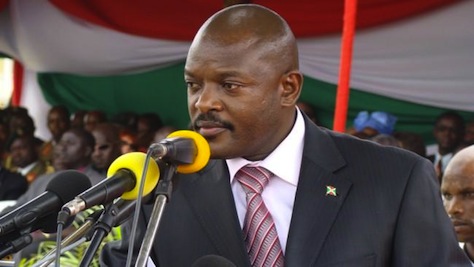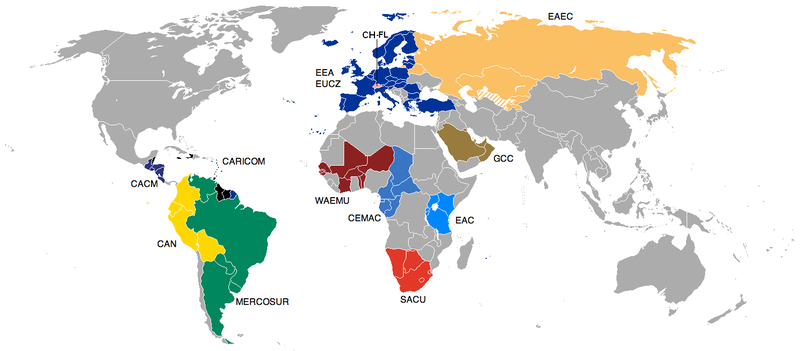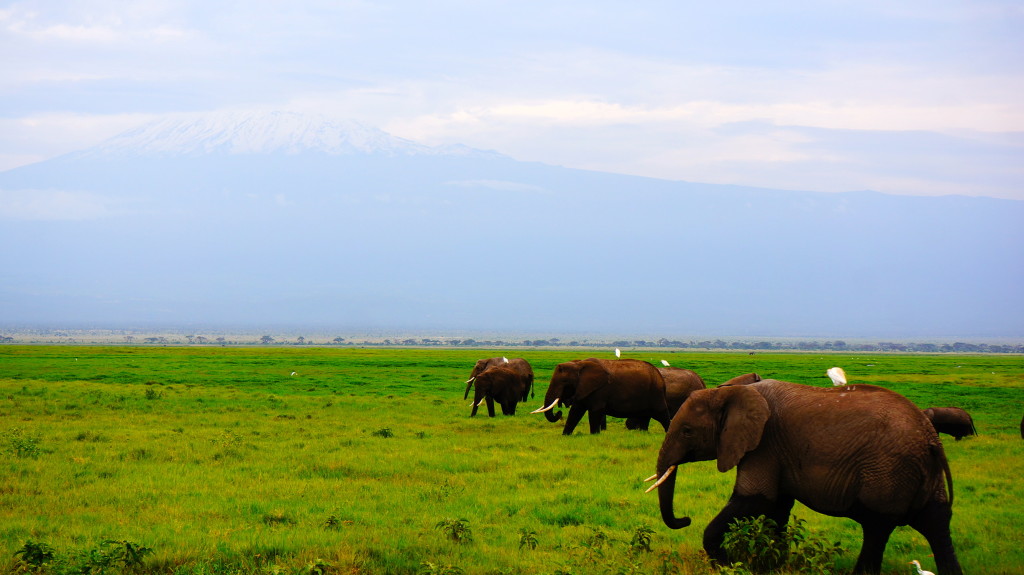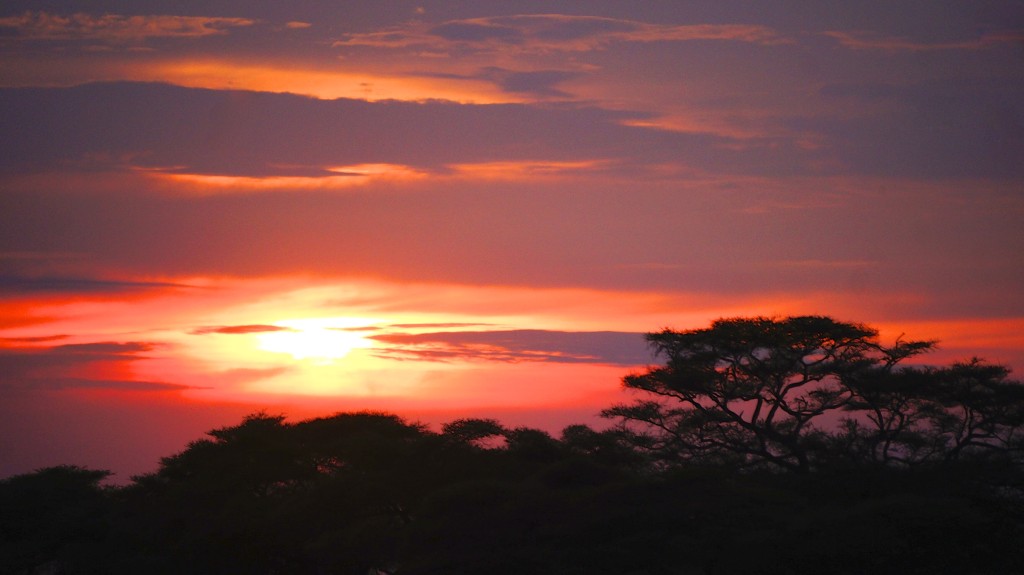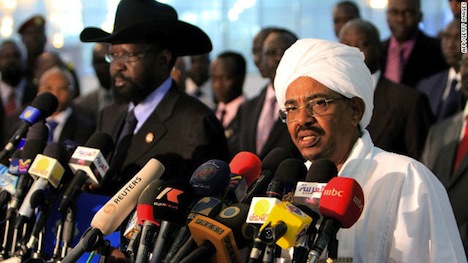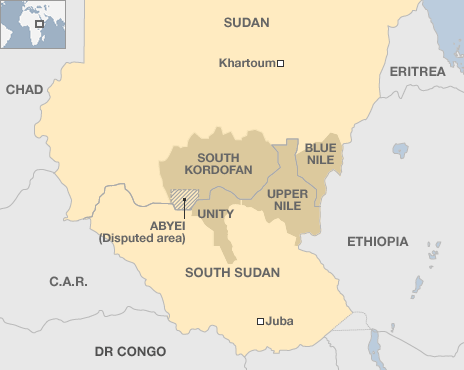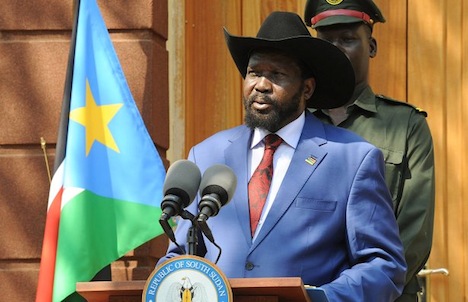
Around 48 hours ago, South Sudanese president Salva Kiir announced that his government had halted a hazy coup attempt against Kiir’s government, which took power in July 2011 after the country emerged as an independent nation from Sudan.
But Kiir’s announcement seemed less like the end of the matter than the start of the worst ethno-political rupture since South Sudanese independence, pitting Kiir’s Dinka ethnic group against the Nuer ethnic group of his fiercest rival, former South Sudanese vice president Riek Machar. Instead of stability in the capital city of Juba, the past two days have brought sporadic rounds of gunfire as armed forces allied with either Kiir (pictured above) or Machar clash in the streets, and there are reports of at least 500 people dead in Juba.
Kiir reshuffled his cabinet in July 2013, which led to Machar’s dismissal from the South Sudanese government. For his part, Machar has criticized Kiir as increasingly ‘dictatorial.’
 Hopes ran high in the aftermath of the January 2011 referendum, in which 98.83% of the South Sudanese voted in favor of separating from Khartoum. But since July 9, 2011, the country’s first 29 months have not been good ones for the world’s youngest country. Aside from oil, the revenues of which South Sudan shares untidily with Sudan (which controls access to the oil pipelines that pump petroleum from South Sudan to the Red Sea coast), the country has been described as the world’s most underdeveloped.
Hopes ran high in the aftermath of the January 2011 referendum, in which 98.83% of the South Sudanese voted in favor of separating from Khartoum. But since July 9, 2011, the country’s first 29 months have not been good ones for the world’s youngest country. Aside from oil, the revenues of which South Sudan shares untidily with Sudan (which controls access to the oil pipelines that pump petroleum from South Sudan to the Red Sea coast), the country has been described as the world’s most underdeveloped.
It’s difficult to understand just how difficult the challenge is for South Sudan.
When it separated from Sudan, it was a country with virtually no institutions — don’t think of it like the pushes for Scottish or Catalan independence, where the sub-national units have experience with regional governance. To the contrary, southern Sudan had essentially been engaged in a resistance struggle against its northern rulers in Khartoum for all but 10 years of the 55 years between Sudanese independence from the British and South Sudanese independence from Sudan. It’s a landlocked country with no access to ports. Oil wealth has proved a source of wealth, but also nearly unbelievable corruption. Its GDP in 2012 was just $9.4 billion, and its GDP per capita is around $860. Its literacy rate is around 27%. Though its past is linked to Sudan in the north, and its leaders largely agree that its future lies with east African neighbors, such as Uganda and Kenya, its present is marked by rupture with the former and a lack of durable links with the latter. It faces a long slog in terms of simply building roads and delivering fresh water to its citizens. Infant mortality is 105 per 1,000 live births and the maternal mortality rate is 2,054 per 100,000 live births — these are some of the worst mortality statistics in the world.
Facts remain relatively dodgy, and it’s not certain if the ‘coup’ attempt on Sunday and Monday was a genuine plot or Kiir’s response an oversensitive reaction — Machar, speaking to the Sudan Tribune Wednesday, argued that the ‘coup’ itself was a misunderstanding between South Sudanese soldiers before calling Kiir an ‘illegal president.’
But with the US embassy in Juba evacuating all of its non-essential personnel and with thousands of South Sudanese seeking refuge at UN compounds in Juba, the situation seems to be worsening. As South Sudan appears to move closer to the point of civil war, it’s important to remember that its chief ethnic groups have much more in common with each other than with the Khartoum elite that once ruled Juba from afar — and who would love to take advantage of internal South Sudanese strike in order to gain firm control of the Abyei region and, potentially, launch incursions to other oil-rich areas. Though the Dinka (about 15% of the South Sudanese population) and the Nuer (about 10%) represent the two largest and politically strongest ethnic groups in the country, around three-fourths of South Sudan’s 11 million people belong to one of over five dozen other ethnic groups.
Speaking of its past, you can lay many of South Sudan’s woes at the feet of Khartoum, which for so long simply ignored what used to be southern Sudan, or even the British colonialists who so curiously fashioned the failed state that would later become Sudan. Continue reading How to prevent South Sudan’s impending civil war →
![]()
